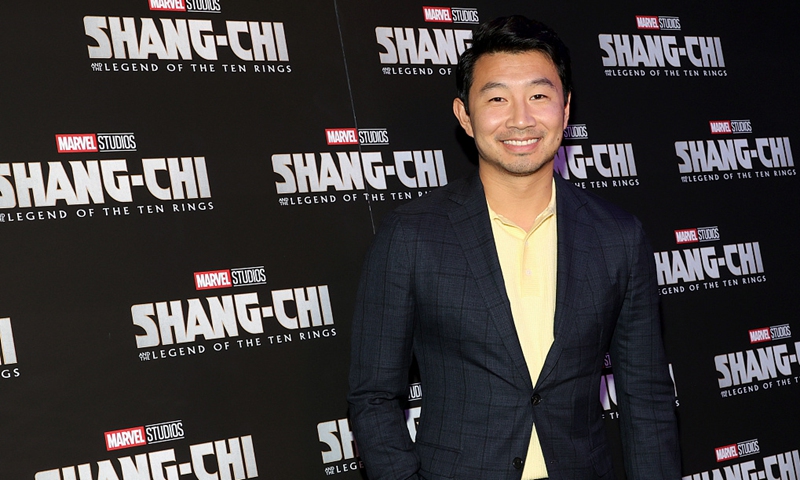ARTS / FILM
Marvel’s first Asian superhero fails to win Chinese audiences’ hearts, showing that even kungfu cannot save a movie full of Western stereotypes about China

Simu Liu attends the "Shang-Chi and The Legend of The Ten Rings" New York Screening at Regal Union Square on August 30, 2021 in New York City, the US. Photo: CFP
It is a right decision that Marvel Studios' first Asian superhero movie Shang-Chi and the Legend of the Ten Rings was not released in the Chinese mainland, because even if mainland audiences had the chance to see it in cinemas, it very likely would have received the same reception as Mulan, a 2020 work aimed at Chinese audiences that met its Waterloo in the region.
Shang-Chi is full of Chinese cultural elements, the most highlighted part is that lead character Xu Shang-Chi, played by Canadian actor Simu Liu, saves people through Chinese martial arts, or kungfu. But even kungfu cannot save a movie containing Western stereotypes and a character originating from a racist background when it was originally created for the comics.
That character is Shang-Chi’s father, who was called the Mandarin in the original comic while the movie producers gave him a new name “Xu Wenwu.”
The character is played by actor Tony Leung from Hong Kong.
The Mandarin’s origins are associated with an early-20th century novel featuring Fu Manchu, a representative of the "Yellow Peril" in the West. This connection sparked controversy in 2019 when Marvel first announced the project.
The film tries its best to distance the character played by Leung from Fu by having Wenwu explain to his son that he is not the “Mandarin” and that the name was used by someone pretending to be him.
Despite this, the movie is still based on the original comic and the image of the character in the comic looks nearly the same as the traditional image of Fu in the West that stands as an insult to Chinese people, so the explanation in the movie just shows Marvel’s guilty conscience and cannot erase the memories of the controversial character’s origins from Chinese audiences, even those who are fans of Marvel.
Shang-Chi and the Legend of the Ten Rings finally launched on Disney’s streaming platform more than two months after its cinema release in North America, meaning overseas audiences will have an easier time watching the work.
Sadly, the many Chinese elements in the movie are likely to misguide overseas audiences and might give them the wrong impression about Chinese culture, similar to the problem with Mulan.
The movie is like Chinese food in the US. It fits the tastes of US audiences, but it's not really Chinese. For example, the film included several types of mythical creatures from Chinese fairy tales and showed them living together but actually these creatures would have fought each other in a fierce battle if they ever ran across one another.
Even the kungfu scenes are not enough. The action choreographers should have included more fight scenes that show the different styles of kungfu.
Some Chinese who have watched the film in places such as Singapore and the US have already uploaded reviews on Chinese media review platform Douban, where it currently has a low 6.3/10 on the platform.
"The story of the film is far too imaginary. Hollywood added their own understanding of Chinese culture to the movie but that did not please Chinese audiences. Why did they not find more creative talents from China in Hollywood? That would be a good way to capture the hearts of Chinese audiences," Chinese film critics commented after Mulan had been released in the mainland.
Similar reviews have appeared after Shang-Chi launched. If Western filmmakers want to produce movies about Chinese culture that will become truly popular in China, they should do more research on Chinese culture.
